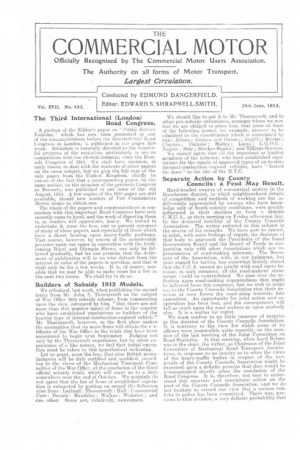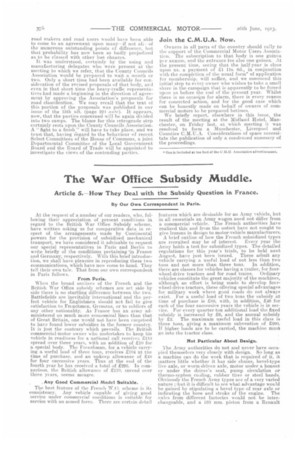The Third International (London) Road Congress.
Page 1

Page 2

If you've noticed an error in this article please click here to report it so we can fix it.
A portion of the Editor's paper on " Public Service Vehicles," which has now been presented as one Of the communications before the leternationa! Road Congress in London, is published in our pages this week. Attention is naturally directed to the wonderful progress of the motorbus, particularly in sev,a:e competition with the electric tramcar, since the Brussels Congress of 1910. We shall have occasion, in early issues, to deal with the contents of other papers on the same subject, but we give the full text of the only paper from the United Kingdom, chiefly by reason of the fact that a corresponding paper, by the same author, on the occasion of the previous Congress at Brussels, was published in our issue of the 4th August, 1910. A few copies of the 1910 paper are still available, should new readers of THE COMMERCIAL MOTOR desire to obtain one.
The whole of the papers and communications in connection with this important Road Congress have only recently come to hand, and the work of digesting them is, as readers will appreciate, heavy. We intend to undertake it, none the less, and to present synopses of many of these papers, and especially of those which have a direct bearing upon heavy-traffic problems. That course, however, by reason of the considerable pressure upon our space in connection with the forthcoming Royal and Olympia Shows, can only be followed 'gradually, but we can promise that the deferment of publication will in no wise detract from the interest or value of the papers in question, and that it shall only be for a few weeks. It is, of course, possible that we may be able to make room for a few in the next two issues. We shall try to do so.
.Builders of Subsidy 1912 Models.
We refrained, last week, when publishing the second letter from ar. John E. Thornycroft on the subject of War Office 1912 subsidy scheme, from commenting upon the view, advanced by him, "that there are not more than this number (nine) of firms in the country who have established reputations as builders of the heavier type of internal-combustion-engined vehicle." Mr. Thornycroft, however, in the first place makes the assumption that six more firms will obtain the e-rtificate of the War Offien in the trials that have been announced to begin next September. Judging not only by the Thornycroft experience, but by other experiences of a like nature, we feel that initial exeep-Lion must be taken to this hypothetical reckoning. Let us grant, none the less, that nine British manufacturers will be duly certified and qualified. according to the views of the Mechanical Transport Committee of the War Office, at the conclusion of the third official subsidy trials, which will carry us to a. date somewhere near the end of October. We certainly do not agree that the list of firms of established reputation is exhausted by putting on record thi following nine firms : Leyland: Thornycroft ;Hall : Commercial Cars ; Dennis ; Maudslay ; Walker ; Wolselev ; and one other. Some are, relatively, newcomers. We should like to put it to Mr. Thornycroft, and to other pro-subsidy enthusiasts, amongst whom we now feel we are obliged to place him, that sonic at least of the following names, for example, deserve to he admitted to the classification which is enunciated by him: Albion ; Aiidays and Onions ; Araylls ; Beisize; Clayton ; Daimler ; Halley ; Lacre ; L.G.O.C. ; _Napier; Star ; Straker-Squire; and Tillings-Stevens. We cannot agree that all the important or leading members of the industry, who have established reputations for the supply of approved types of up-to-date internal-comhustion-engined vehicles, have "bowed the knee" to the idol of the M.T.C.
Separate Action by County
Councils: a Feud May Result.
Hard-headed owners of commercial motors in the Manchester district, in which neighbourhood details of competition and methods of working are but indifferently appreciated by owners who have knowledge only of South-country conditions, were greatly influenced in their decision to form a district C.M.U.te, at their meeting on Friday afternoon last, by tho declared hostility of the County Councils Association. The writer referred to this subject in the course of his remarks. We have now to record, in print, with some feelings of regret, the decision of that body to approach the Presidents of the Local Government Board and the Board of Trade in conjunction only with other Associations which are representative of road-making interests. The Secretary of the Association, with, in our judgment, hut poor regard for tactics, has somewhat bluntly stated that the 0.0. A. cannot go jointly with road users because, in sue]) company, all the road-makers' statements -iould be contradicted. We pass over the reflection upon. road-making organizations that might be inferred from this continent, but we wish to point out to the County Councils Association that their decision at once forces the road-using interests into opposition. An opportunity for joint action and cooperation has been lost, and the consequences will fall as notch upon the road makers as upon anybody else. It is a matter for regret.
We must confess to no little measure of surprise at this decision of the County Councils Association. It is contrary to the view for which some of its officers were responsible quite recently, on the occasion of the last meeting of the Joint Committee on Road Statistics. At that meeting, when Lord Belper was in the chair, the writer, as Chairman of the Joint Committee of Mechanical Road Transport Associations. in response to an inquiry as to when the views of the heavy-traffic bodies in respect of the proposals of the County Councils Association might he expected. gave a definite promise that they would he communicated shortly after the conclusion of the Road Congress. It is, therefore, not easy to understand this seParate and precipitate. action on the part of the County Councils Association, and we do not hesitate to record our view that, a serious mistake in policy has been committed. There was, previous to that decision, a very definite probability that
road makers and road users would have been able to come to an agreement upon many—if not. all—of the numerous outstanding points of difference, but that, probability has now been so badly prejudiced as to be classed with other lost chances.
It was understood, certainly by the using and manufacturing delegates who were present at the meeting to which we refer, that the County Councils Association would be prepared to wait a month or two. Only a short time had been available for consideration of the revised proposals of that body, and even in that short time the heavy-traffic representatives had made a beginning in the direction of agreement by approving the Association's proposals for road classification. We may recall that the text of this portion of the. proposals was published in our issue of the 13th ult. (page 22,1 (swe). It appears, now, that the parties concerned will be again divided into two camps. The blame for this retrograde step certainly rests upon the County Councils Association. A " fight to a finish" will have to take place, and we trust that, having fegard to the behaviour of recent Select Committees of the, House of Commons, a joint Departmental Committee of the Local Government Board and the 'Board of Trade will be appointed to investigate the views of the contending parties.
Join the C.M.U.A. Now.
Owners in all parts of the country should rally to the support of the Commercial Motor Users Association. The subscription to that body is one guinea per annum, and the entrance lee also one guinea. At the present time, seeing that the half-year is close upon us, a payment of El us. 6d., in conjunction with the completion of the usual form* of application for membership, will suffice, and we commend this initial step to every owner who wishes to take a small share in the campaign that is apparently to be forced upon us before the end of the present year. Whilst there is no occasi,,nn for alarm, there is every reason for concerted action, and for the good case which can be honestly made on behalf of owners of commercial motors to he prepared betimes.
We briefly report, elsewhere in this issue, the result of the meeting at the Midland Hotel, Manchester, on Friday last, at which meeting it was resolved to form a Manchester, Liverpool and Counties car.r.A. Considerations of space necessitate the publication of only a -condensed summary of the proceedings.
































